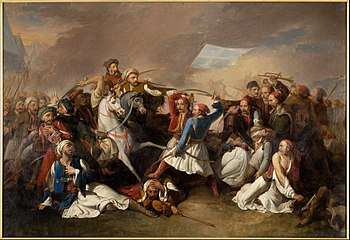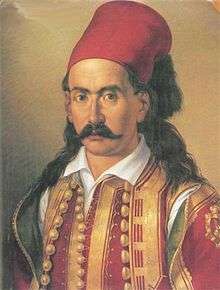Battle of Karpenisi
The Battle of Karpenisi took place near the town of Karpenisi (in Evrytania, central Greece) on the night of August 21st 1823 between units of the Greek revolutionary army[1] and Ottoman troops.
| Battle of Karpenisi | |||||||
|---|---|---|---|---|---|---|---|
| Part of the Greek War of Independence | |||||||
 The death of Markos Botsaris by Marsigli Filippo | |||||||
| |||||||
| Belligerents | |||||||
|
| ||||||
| Commanders and leaders | |||||||
| Markos Botsaris † | Mustai Işkodralı Pasha[2] | ||||||
| Strength | |||||||
| 350 Souliotes [3] | 4,000 soldiers | ||||||
| Casualties and losses | |||||||
| minimal | c.1,000 dead | ||||||
Background
After the Ottoman failures of 1822, the Sultan devised a plan of invading Greece (1823). An army was destined to invade Peloponnese by the west side of Central Greece and Patras. The leadership of this army was taken over by the pasha of Shkodra, Mustai Bushati. Mustai assembled his army at Ohrid and it consisted to be 8,000 Albanian Ghegs[4](according to others there were 10,000[2] or 13,000[1]), which three thousand of them were Catholic Mirdites. These Mirdites also formed the advanced guard of Mustai's army.[5]
The Greeks had made no preparations to oppose the Albanian campaign. The President of Greece Alexandros Mavrokordatos had left Missolonghi and anarchy had spread over the Greek forces.[6] In addition, the general who oversaw operations in Western Greece, Markos Botsaris, left Missolonghi and marched with a small force of soldiers in order to stop Moustai, despite the fact that the rest of the Greek chieftains wouldn't support him due to their envy and disagreement.[7]
Meanwhile, the advance of the Albanian army became one of the most brilliant exploits of the war. Four thousand troops, consisting of both Catholics and Muslims, lead by Djelaledin Bey, encamped in the valley of Karpenisi, near a fountain abundant with spring water. The men could rest here before advancing further.[8]
Battle

At midnight of August 21st 1823, Markos Botsaris assaulted the Albanian camp with a force of 350 Souliotes, believing surprise would secure their victory over Mustai's larger army. Mustai's men were overconfident and had not taken proper defensive measures prior to the assault. The Souliotes took advantage of their vulnerabilities and managed to inflict severe casualties on the enemy's camp. The Ghegs and Mirdites, roused from sleep, ran from the battlefield leaving their weapons behind.[9]
Djelaledin Bey had pitched his tent inside a walled enclosure and the Souliotes rushed towards it in the hope of slaying him, but they retreated after Markos Botsaris was shot in the head during the skirmish. The Souliotes took up his body and left the battlefield before dawn.[10] The army of Mustai had lost 1,000 men while the Greeks had minimal casualties.[1]
After the battle of Karpenisi the Albanian forces moved against Missolonghi and sieged it. Although they were finally defeated and Mustai Pasha retreated in Albania (November 30th 1823).
References
- Showalter, Dennis (2013). Imperial Wars 1815–1914. Amber Books. ISBN 9781782741251.
Markos Botsaris' band of 450 Greek rebels made a night attack on an Ottoman Army of 13,000 men encamped near Karpenisi. The Greeks inflicted 1000 casualties almost without loss, but retreated...
- Bradford, James C. (2004). International Encyclopedia of Military History. Routledge. ISBN 9781135950330.
...an Ottoman force of 10,000 Albanian mercenaries led by Mustai Pasha was routed by Markos Botsaris, who was killed in the Battle of Karpenisi (21 August 1823).
- Finlay George, History of the Greek Revolution, volume II, page 10
- Finlay George, History of the Greek Revolution, volume II, page 6-11
- Finlay George, History of the Greek Revolution, volume II, page 6-9
- Finlay George, History of the Greek Revolution, volume II, page 9
- Nikos Giannopoulos, "Markos Botsaris, the absolute exemplar of heroism", Military History, issue 138, 2008, page 16, Publications Periskopio
- Finlay George, History of the Greek Revolution, volume II, page 10
- Finlay George, History of the Greek Revolution, volume II, page 10
- Finlay George, History of the Greek Revolution, volume II, page 6-11
Sources
- Paroulakis, Peter Harold. The Greeks: Their Struggle for Independence. Hellenic International Press, 1984. ISBN 0-9590894-0-3.